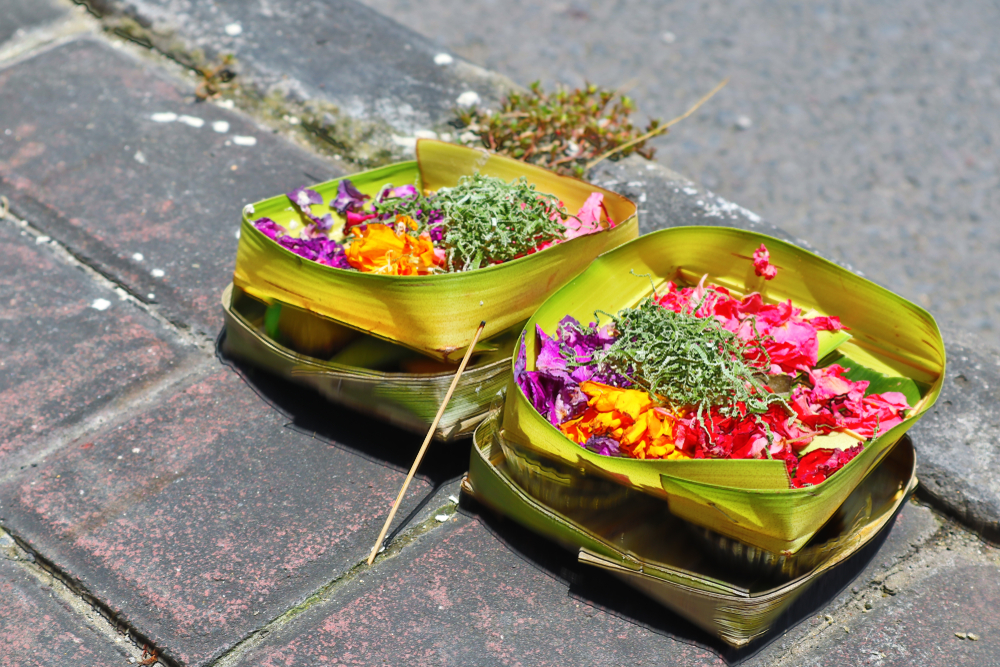The Balinese are used to welcoming people to their island and are typically warm and friendly to visitors. A smile goes a long way in Bali, and a friendly grin is the best and the quickest way to connect with people.
The culture of Bali is heavily influenced by the island’s Hindu culture. Traditional values are upheld proudly, so it is worth taking note of a few do’s and don’ts before you arrive!
Balinese people are used to the presence of foreigners on the island, many speak good English, and most are helpful and welcoming. Observing local practices and customs is a gesture that’s always well received, so it is a good idea to make sure you know some of the local rules of etiquette before you go.

Etiquette, Customs, and Traditions in Bali
Greetings
The best way to greet someone in Bali is with an open, friendly smile. Smiling is how the Balinese connect with strangers, and the gesture will be appreciated by the people you meet. Many people in Bali will greet you with a handshake, but the traditional greeting is the Sembah salute, in which both hands are placed, palms together, in front of the chest.
Gestures
Pointing is considered rude in Bali. If you want to gesture to something, it is better to use your thumb. To get someone’s attention, gesture or wave with your whole hand, and with your palm facing down.
You should also avoid using your left hand as much as possible, particularly when shaking someone’s hand, passing things, or taking things from someone. This is because the left hand is considered ‘dirty,’ which is typical for some Asian countries.
When giving or taking things, such as money, it is considered polite to use both hands.
Offerings (Canang sari)
Canang sari are small offerings usually made of a woven leaf basket and containing flowers, fruit, incense, and sometimes coins. You’ll see these everywhere in Bali, especially in the morning when the Balinese make their offerings to the Creator.

Canang Sari are placed on sidewalks, outside shops, and on steps, but be careful not to step on them. Standing on an offering is a move that’s considered deeply offensive by the Balinese, so watch where you put your feet.
Public displays of affection
PDA is a big cultural no-no in Bali, as romantic gestures such as kissing and hugging are considered private. Hand-holding is fine, however.
Alcohol
Alcohol is widely consumed on the island of Bali, and Bintang beer is sold at every beachside. Feel free to enjoy a drink, but don’t do drugs – Indonesia’s drug laws are archaic and extremely strict.
Clothing
Bali has a conservative culture, and visitors should respect this by dressing modestly. Women should keep their shoulders and chest covered, and avoid wearing short skirts, or anything else that is excessively revealing in public. Men should wear a shirt in public, and preferably one that doesn’t leave nipples on display.
Of course, the beach is a different story, and the clothing rules are relaxed around more touristy areas.
Shopping

Bartering is common practice in Bali’s markets and street shops. Make sure you haggle over the price to avoid getting ripped off but be polite. Don’t haggle too hard – those few pennies you’re trying to save might make a lot more difference to the seller than they do to you.
Religion
If you plan to visit the temples or any other religious site in Bali, it is important to respect the rules and dress code. Men and women alike need to cover their shoulders, and you should also wear a sarong to fully cover your legs. Sarongs are available to borrow or rent from most of Bali’s most popular temples. It should also be noted that you should not enter a temple if you are bleeding or pregnant.

Do
Smile! Smiling is how the Balinese greet and welcome people; an open, honest smile is a gesture that will be appreciated and reciprocated wherever you go.
Take off your shoes before entering someone’s house. This is common practice throughout Asia, and makes a lot of sense – who wants dirt trampled throughout their home?
Dress modestly. Especially when visiting temples and religious sites, and when exploring outside of the main tourist areas.

Image source: https://commons.wikimedia.org/wiki/File:Three_Balinese_girls_wearing_kebaya.jpg
Don’t
Point or gesture with your feet. The feet are considered ’dirty’ in Bali, so to point them at someone is considered an insult.
Touch a Balinese person on the head. The head is thought to be the most sacred part of the body, so to touch someone here is very disrespectful.
Use your left hand. Avoid using your left hand as much as possible, particularly when passing or taking things from another person.
Make public displays of affection. Kisses and cuddles between lovers in public are frowned upon in Bali, although you can still hold hands.
Lose your temper. If you get into a disagreement, keep your cool whilst in public. Shouting and being confrontational are considered deeply offensive, and losing your temper is downright shameful as far as the Balinese are concerned. To keep the respect of those around you, be sure to stay calm and reasonable.
Should you tip in Bali? How much?
Tipping is not common practice in Bali, and it is not expected of customers. Whether or not you should tip is a matter of opinion, depending on where you are dining. In western restaurants, which tend to be more expensive, a service charge is routinely added to your bill. This charge is usually 10 or 15% but can be as high as 20%. Most people consider this to be enough of a tip and do not feel the need to leave extra. If you happen to be in a western-style restaurant that does not charge a service fee, you can tip around 10%, if you like.
In more traditional cafes and restaurants, outside of the main tourist areas, tipping is not usually practiced at all.
What should you wear in Bali?
Balinese culture is quite conservative, and both men and women should dress modestly. It is not uncommon to see men walking around topless and women in short shorts, especially around Kuta, but this is considered impolite and distasteful. It is unlikely anyone will confront you, but that doesn’t mean that people around you are comfortable with your actions.
Men should stick to shorts and T-shirts when out and about, and women should cover their chest and shoulders. Avoid wearing skirts or shorts that are excessively short, and always cover your legs when visiting temples.

Of course, different rules apply to coastal areas, particularly in the more touristy spots. In these places, swimsuits at the beach are completely acceptable, though nude or topless sunbathing is not.
